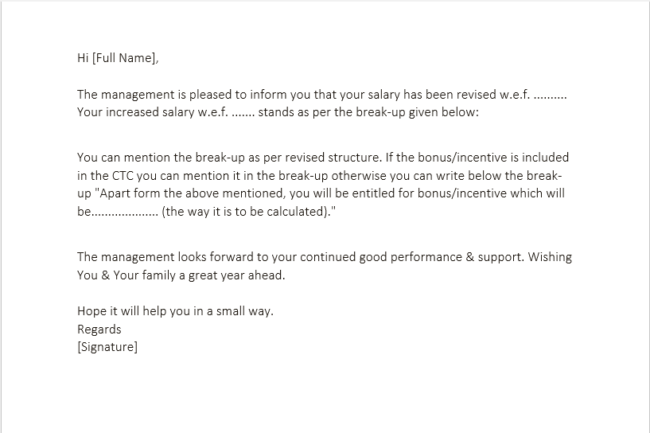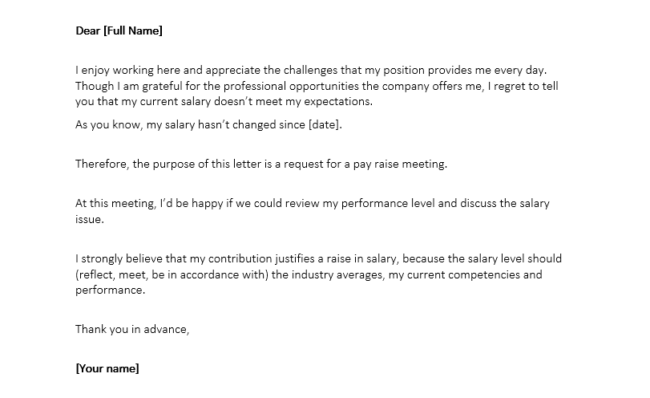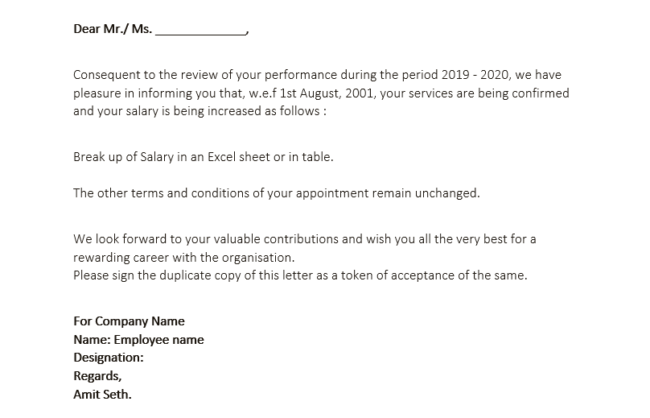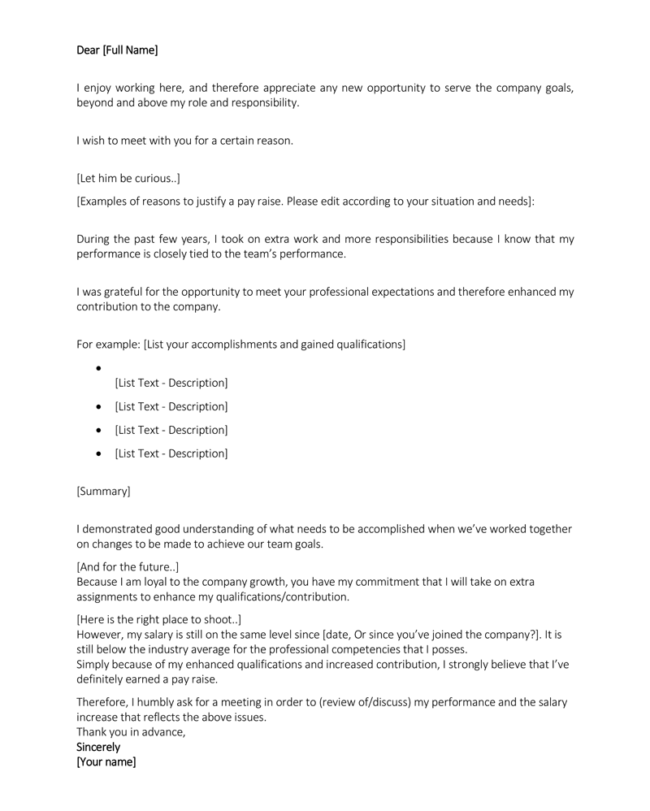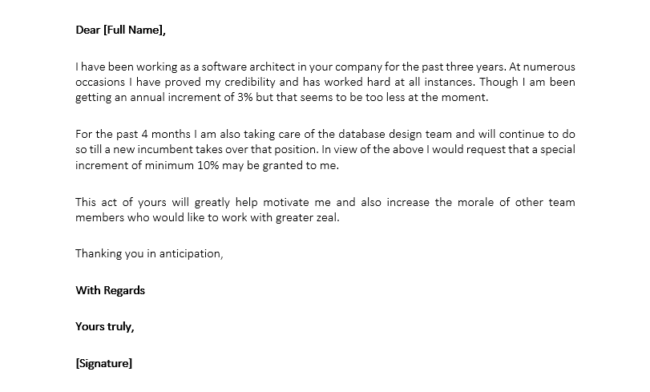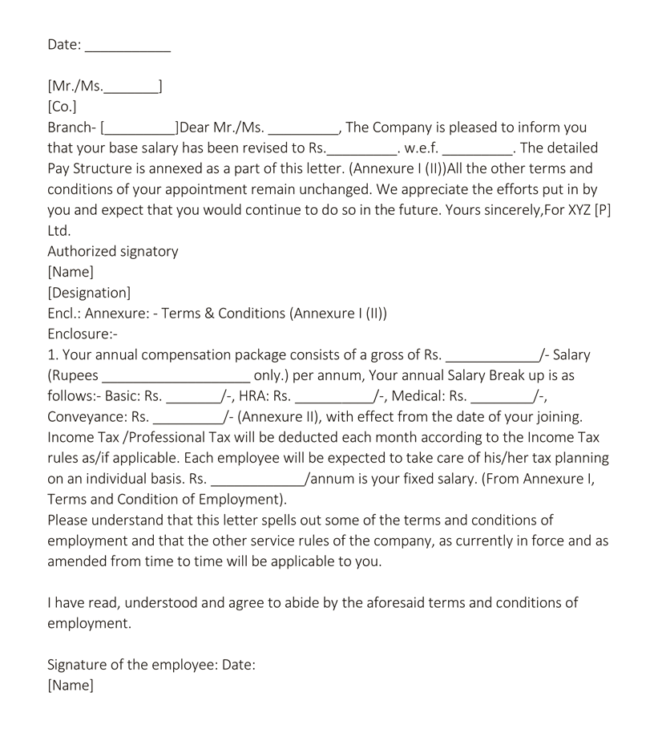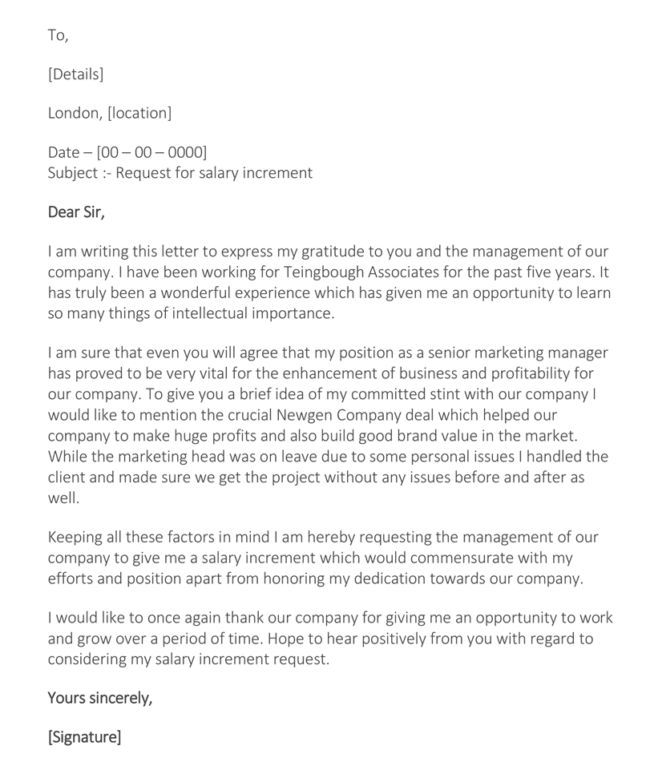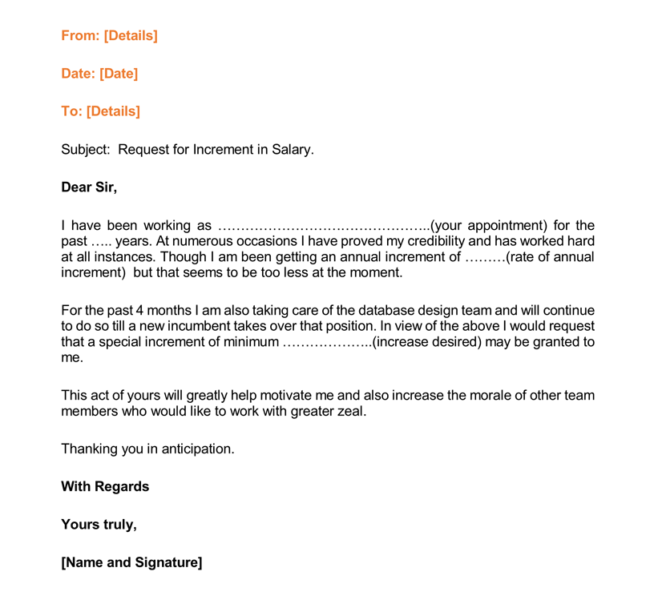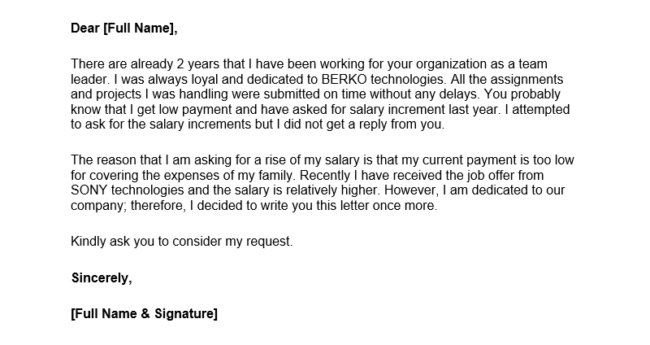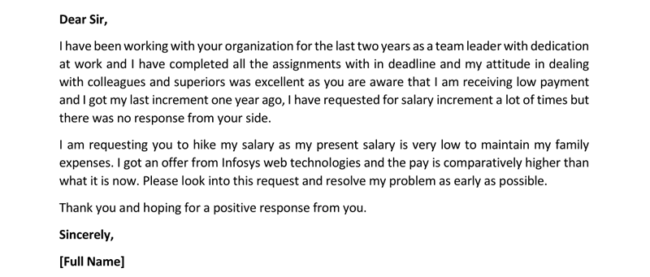A salary increase letter is a written formal request by an employee asking for a salary increment from their employer – manager, supervisor, and head of department or company.
The letter ought to be addressed to the person responsible for approving raises and bonuses. Having a salary increase request in writing establishes a professional and formal process of asking for a raise. The letter serves as formal documentation of the request. Once the employer receives a salary increase request in writing, it goes into the employee’s file.
Having the letter in your records puts pressure on the employer to approve your request as time passes. If the request is not feasible at the moment, the employer can always refer to the letter to determine what was requested at a later date when the request can be granted. If an employee has already made a verbal request to no avail, putting the request in writing gives an accurate timeline and proof of the request. This way, the letter eliminates any doubts the employer would have about the seriousness of the request.
Written salary increase letters eliminate the awkward and tense process of seeking the raise through an in-person conversation. It allows you to prepare by outlining the reasons why you deserve the raise and choosing the right words to ask for it convincingly.
note
Avoid going over the person in charge of salary increments and bonuses; a lack of respect for hierarchy creates the wrong impression.
Sample Salary Increase Letters

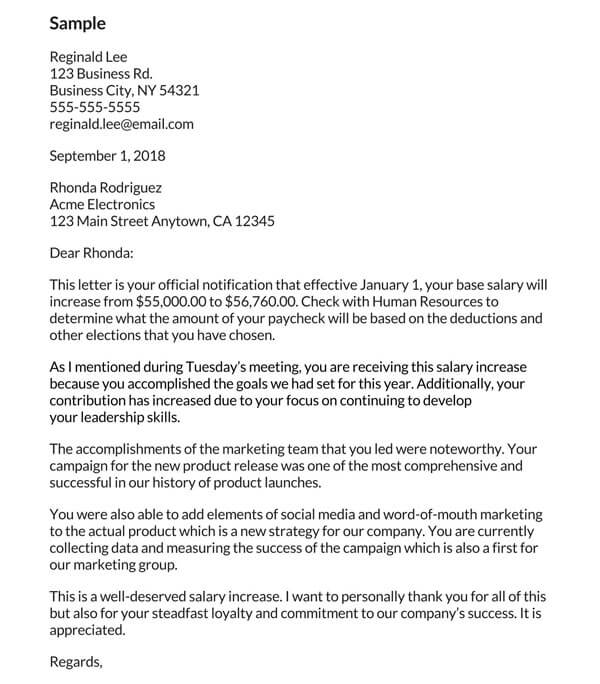
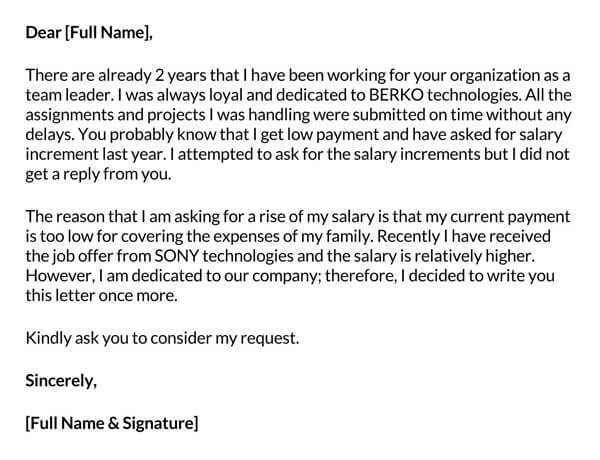
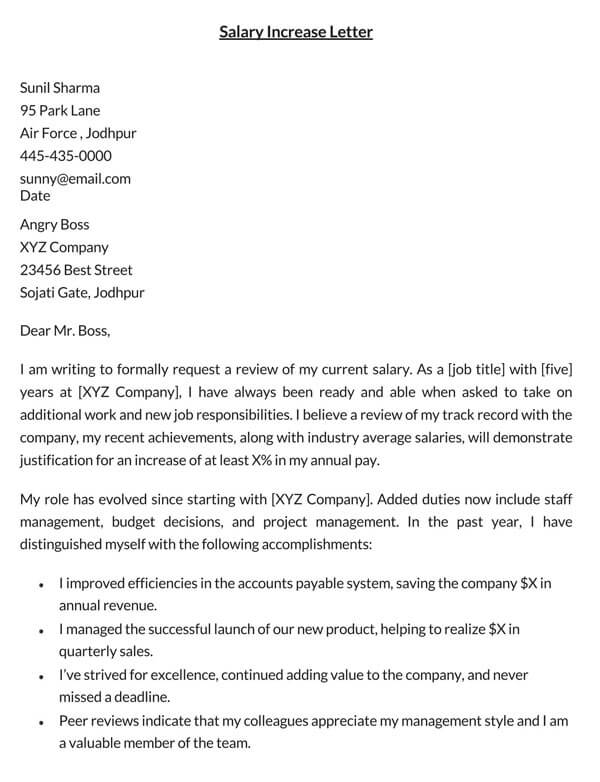
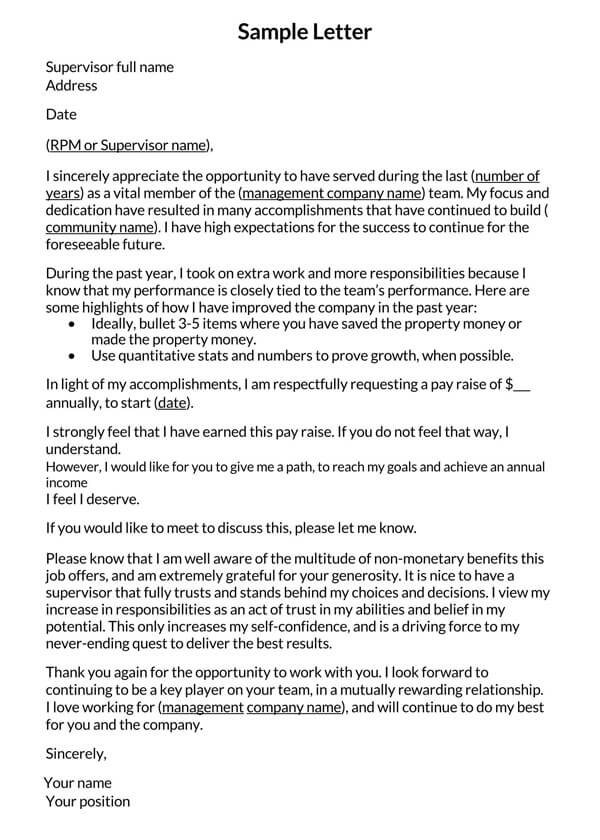
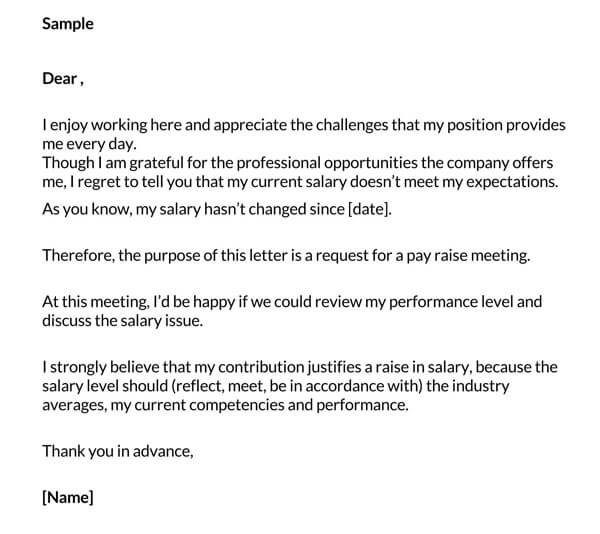
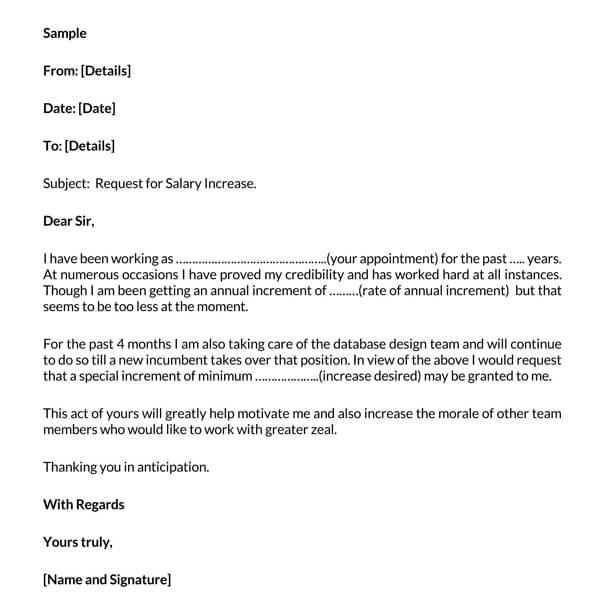
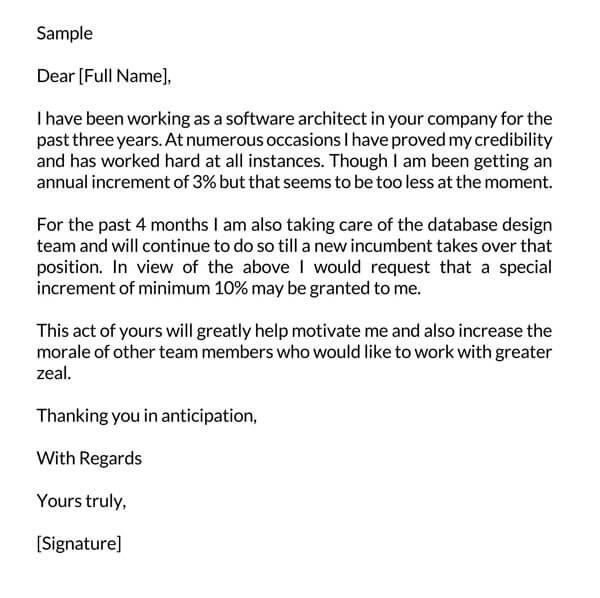
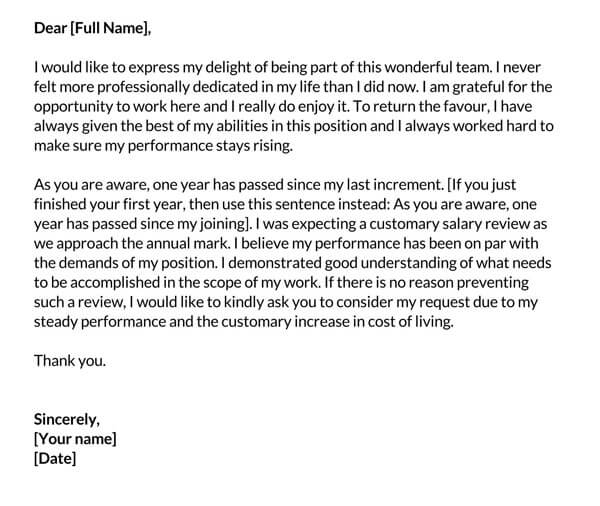
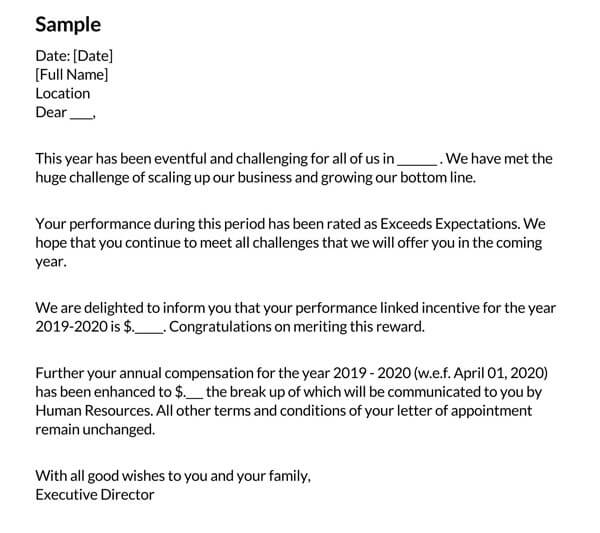
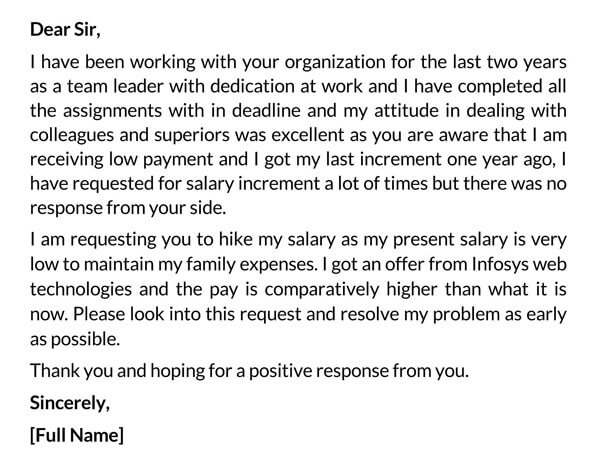
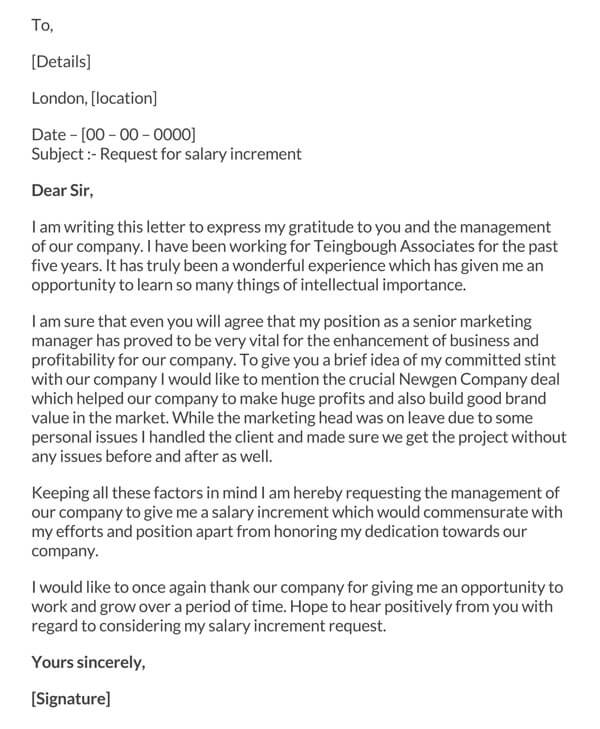

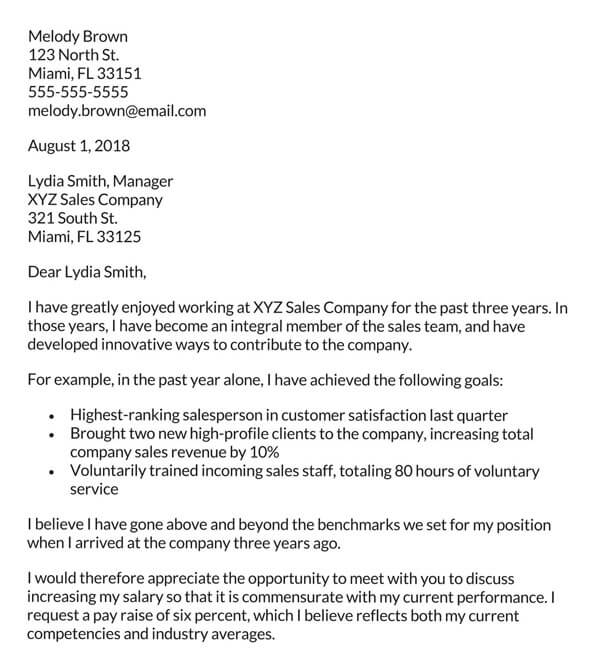
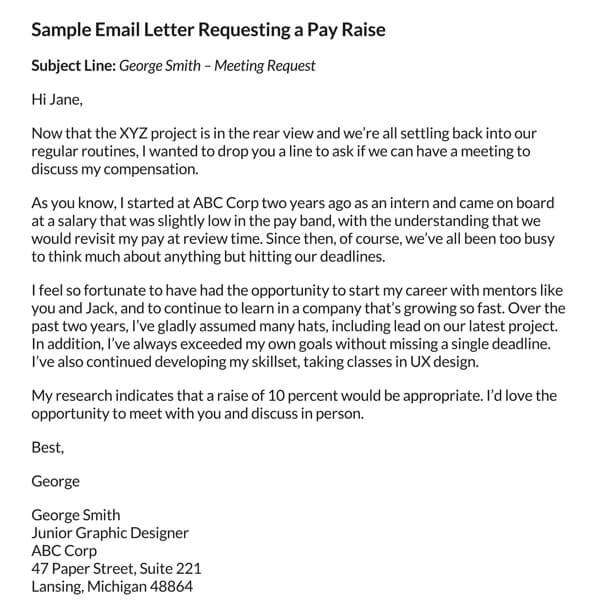

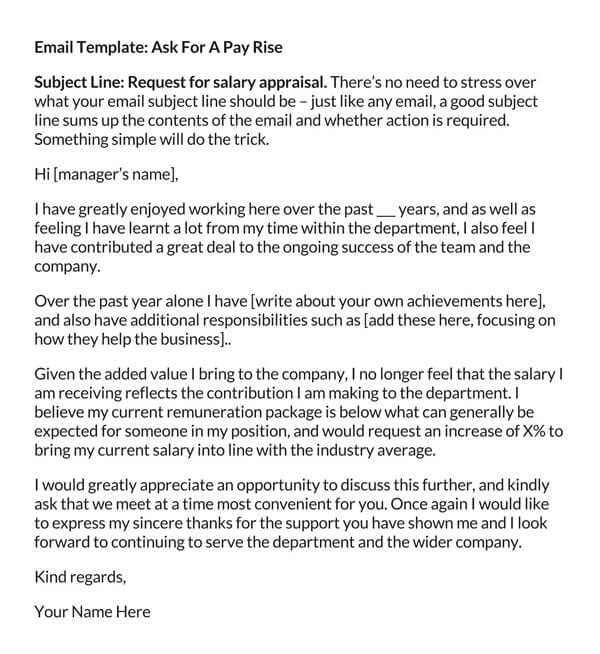

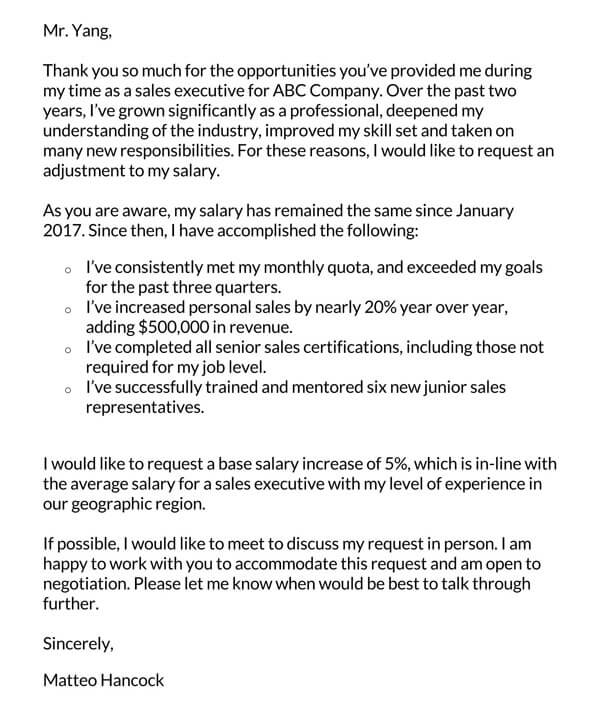
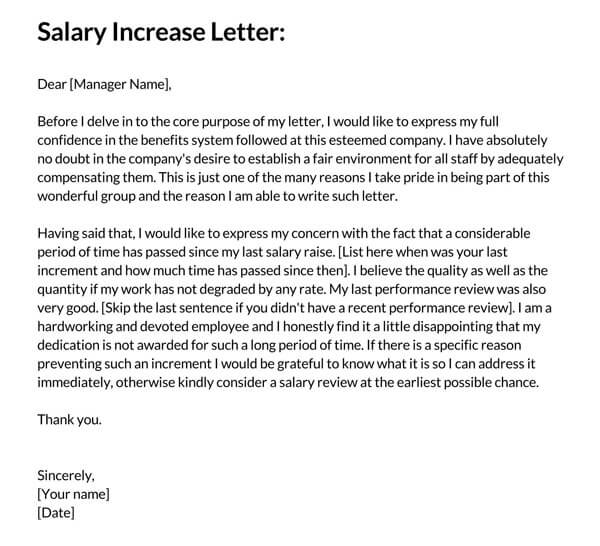
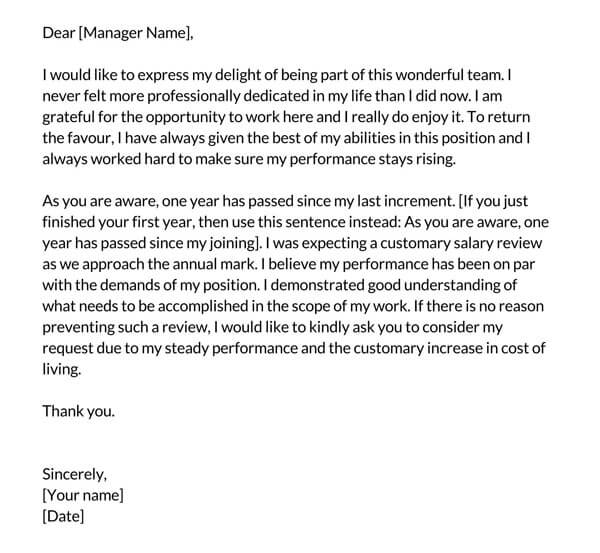
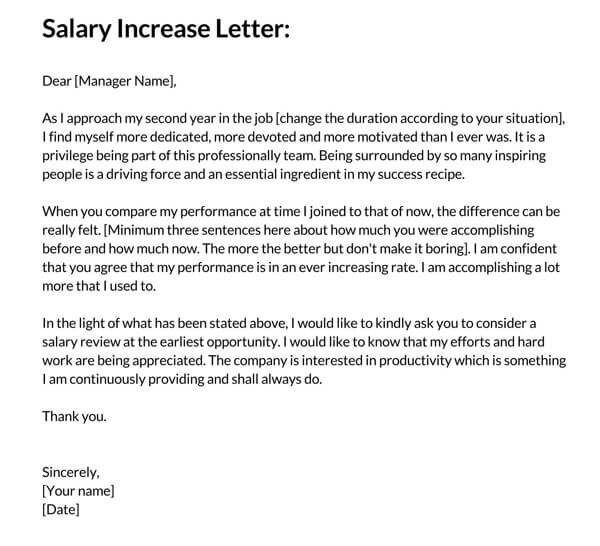
How do I Talk to My Boss About a Salary Increase?
Asking for a salary increase is often a less involved step than searching for a new job when you believe you are not being paid what you deserve. However, how an employee asks for a raise will often influence the employer’s decision to approve or deny the request. This article will discuss the steps employees can follow to ask for a raise.
Do your salary research
Before proceeding to craft the letter, employees should conduct comprehensive research to determine procedures for a raise in the company and the raise constraints in line with the job market. Understand the competitive wages that employees working in the same capacity and region as yourself are entitled to. Thorough research ensures that you approach with concrete data supporting your claim.
Evaluate your position in the company
It is then important to evaluate your position in the company and the value you bring to the table. Essential employees, such as specialists, have high negotiation leverage. However, any employee can prove their worth to the company if they can prove it effectively.
Wait for the right time
Timing is vital when asking for a raise. Employees who send the letter at the right time have a higher chance of getting their request approved than those who don’t. The following are good instances to send the request:
When the company is doing well
There are times when the company is doing so well, and sometimes it is not. Requests handed in when the company is making significant profits are more likely to be approved. Management will often feel obliged to reward exemplary performing employees who have contributed to financial growth.
After completing a substantial project successfully
Asking for a raise after completing a significant project in the company is recommended, especially if the employee made a quantifiable contribution. This way, your accomplishments are still fresh in the employer’s mind.
If it has been a year since the last raise
Ask for a raise if it has been more than a year since the last raise; this is even more so for companies that award salary increments on an annual basis.
After a good performance review
If you had an exemplary performance during the last employee performance review, this is considered an excellent time to hand in your letter. A good performance review increases your leverage and thus raises your negotiation position.
When you are paid below the market rate
Once you have determined that you are being paid a lower salary than the average market rate for your position, employers will take the request more seriously to be law-compliant.
After an increase in daily duties
Asking for a raise when you have been assigned more responsibilities is recommended, for this can be used as a justification for the raise. In addition, more responsibilities should often translate to more compensation.
When you have improved your skills and qualifications
It is a good time to ask your employer to increase your salary immediately when you acquire new skills and qualifications. This is because it is seen as an increase in your value in the company. Ensure the skills and qualifications can be linked to your roles and responsibilities in the company.
Have the right frame of mind
It is recommended that you neutralize all personal and negative feelings when asking for a raise. Doing so helps an employee be objective and focus on the relevant information associated with the raise.
Request for a meeting
Even if this letter is issued, holding a meeting with the employer can come in handy in getting the raise. As much as an in-person meeting is dreadful, it gives you an opportunity to appeal to the employer’s personality, thus boosting your chances of getting your request approved.
Set everything up
Plan everything. The company always wants to know they are awarding the raise based on merit and benefits. Therefore, you can set up the request to reflect a win-win situation for both the employer and the employee.
Write down examples of reasons
Lastly, write down all the justifiable reasons why you deserve the raise. These reasons are then outlined in the letter to be handed to the employer.
Related: How to Disclose Your Salary Requirements
What Should You Include in Your Salary Increase Letter?
The letter should present the request and the specifics. In addition, it should address who, what, why, and when regarding the salary increase request. To address these questions, employees should include a few important items in their letters.
These include:
Job title
The employee’s position in the company will help the employer, manager, or supervisor know who has sent the request. This can be supplemented with an employee identification number.
Period of employment
The letter should indicate the period of time you have been working for the company or employer in the capacity mentioned above. Period of employment will sometimes be a consideration for employers when awarding salary increments. However, it does not hinder deserved raises.
General purpose
The letter’s purpose, which is to ask for a salary raise, should appear either as the subject line or in the first paragraph of the letter. A salary increase letter is an official document, and recipients want to know the letter’s subject before they can review it.
Reasons for your request
Employees should provide reasons why they believe they deserve a raise. Some common reasons that employers award salary raises based on are:
- Employee promotion
- When employees complete the probationary period
- When employees take on new or additional responsibilities
- Increase in the cost of living within the region
- If an employee is being paid below-average market value
- When employees acquire new skills and qualifications
Your accomplishments and justification (s) for receiving a raise
The letter should provide information to back up the reason(s) for requesting the salary raise. You can prove you deserve the raise by listing the accomplishments you have had in that position. The use of quantitative and qualitative information is recommended. Accomplishments are an excellent opportunity to show the value you bring to the company.
Awards and accolades
The letter should indicate any awards and accolades you have received while working for the company, if any.
Supporting material
The employee should provide any supporting information that can further convince the employer to raise his or her salary. For example, supporting material can be certificates of training completion. Attach these documents to the letter.
The amount you’re requesting for
The letter should indicate the salary increment you are asking for. The raise could be in monetary figures or a percentage increase.
Negotiation statement
When requesting a raise, always create room for negotiation. To achieve this, there should be a negotiation statement in the letter that lets the employer know you are willing to listen to his or her proposal. You can also suggest a one-on-one meeting to discuss the issue. In addition, consider other perquisites such as flexible work hours, promotion, stock options, and such.
Appreciation for consideration
The employee should express their appreciation to the employer for considering their request as a courtesy gesture.
Other considerations
The letter should be professionally written and therefore should have the sender’s and recipient’s details and the date. Keep the letter short and detailed; one page will be sufficient. Include a professional closing format by supplying a complimentary close and signature.
What Should You Not Include?
There are things that an employee should avoid while writing this letter to ensure their request does not come off the wrong way. These include the following items:
Complaints
The letter is not an opportunity to complain about every reason you think you deserve the raise. Avoid sounding like you are being victimized. Instead, the language used in the letter should demonstrate a certain level of confidence that you deserve the raise by providing convincing justification.
Salary details of a colleague
Avoid comparing your situation with a coworker’s financial situation. The letter should be focused on you and why you deserve the raise. A colleague being paid a higher salary is not a justification to get a raise. Dragging other people in your business is considered unprofessional. Consider using market values instead of colleagues’ salaries.
Your financial situation
The salary raise letter should be confined to the professional field. Understand that there is a distinction between needing a raise and a deserving one. Personal financial strains should not appear in the letter as reasons why you are requesting a raise.
Company’s financial situation
Even though it is recommended that employees ask for a raise when the company is doing well financially, this fact should not appear in the letter as a reason why you are asking for a raise.
Sample Salary Increase Letter
Dear Mr. Smith,
Subject: Request for Salary Increase
I am writing to formally request a review of my current salary. As you are aware, I have been an employee of XYZ Corporation for the past three years and have thoroughly enjoyed my time contributing to the company’s success. I have always strived to perform my duties with the utmost dedication and to the best of my abilities.
Over the past year, I have taken on additional responsibilities and have made significant contributions to my team and the company as a whole. Some of these accomplishments include leading the successful launch of our new product line, which resulted in a 20% increase in sales, and streamlining the client reporting process, which enhanced our team’s efficiency by 30%.
I believe that my efforts and contributions go beyond the scope of my current role as a Senior Marketing Coordinator, and I am committed to continuing this level of high performance. Considering my achievements and in line with the industry standards, I kindly request a review of my salary to reflect my current responsibilities and contributions to the company.
I understand that salary decisions are based on multiple factors, including the company’s budget and compensation policies. Therefore, I am open to discussing this further at a time convenient for you. I am confident that we can reach a mutual agreement that reflects the value of my work to XYZ Corporation.
Thank you for considering my request. I look forward to continuing to contribute to our team’s success and the company’s growth.
Sincerely,
Jane Doe
Analysis
The letter requesting a salary increase is a prime example for employees. It starts with a formal tone, immediately conveying professionalism, and clearly states its purpose. The positive opening appreciates the employee’s time with XYZ Corporation, setting a constructive and loyal tone.
The core of the letter highlights specific achievements, like leading a successful product launch and enhancing team efficiency, with measurable outcomes. These accomplishments justify the raise request and demonstrate the employee’s value beyond their current role, aligning with industry standards.
Finally, the letter shows professionalism and willingness for dialogue, acknowledging the complexity of salary decisions and the company’s policies. It concludes by reaffirming the employee’s commitment to the company’s future, presenting a well-structured, succinct, and persuasive argument for a salary review.
Salary Increase Letter Examples
Frequently Asked Questions
The person who manages your salary or bonuses is the only person you are supposed to ask for a salary increase. People should always ask the manager for a pay raise since he/she is the one in charge of handling such important matters as a salary increase. He/she is also the one above every other employee in the organization. Different companies have different people who handle salary raises. The letter should help keep the request more formal and professional. I can be either a handwritten or soft copy.
Your reasons for asking for a pay raise should be valid and justifiable. You are supposed to come up with a list of things that you have accomplished for the company you are working for over the years.
You should also take into consideration the last time you were given a pay raise. You should also ensure that you do not leave out the accomplishments that had a positive impact on the company.
Sometimes the amount of money that you are being paid is less than what you think you are supposed to get. Examples will be necessary when asking for that pay raise. It is very much advisable to Google on other sites the rates that your job offers or similar jobs in the industry.
Sometimes asking for a pay raise can be an uphill task. This is because it is not a sure thing whether your request will be approved or not. Besides, if not done right, you may leave a negative impression. It might be your right to ask for a raise but it also lies within your employer’s rights to deny or approve it.
Increase the chances of a “yes” response by asking for a pay raise when:
The company or organization is doing well financially.
You are in your employer’s good book; generally, your work should be impressive.
The period you have worked is under the company’s policy of being eligible for a pay rise.
The current market pay rate for your job coincides with what you are asking for.
If everything is in order, you can then confidently create your letter and submit it to the relevant authority.
f a “yes” response by asking for a pay raise when:
Final Thoughts
Employees are entitled to ask for a raise when they believe they deserve one if the employer does not initiate the process. The request is made through a salary increase letter addressed to the party awarding pay raises and bonuses. Employees should do proper research to determine if they are justified in asking for the raise. The process of requesting a raise can be broken down into several steps, as discussed in this article. These steps include research, choosing the proper timing, evaluating their position in the company, and writing down the reasons for the request.
